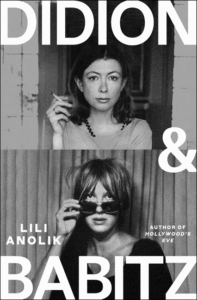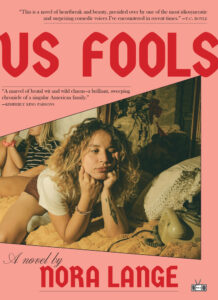
5 Book Reviews You Need to Read This Week
“This savage American novel consumed me, as much as I consumed it.”
Our quintet of quality reviews this week includes Yasmine Seale on Mosab Abu Toha’s Forest of Noise, Ron Charles on Richard Price’s Lazarus Man, Marisa Meltzer on Lili Anolik’s Didion & Babitz, James Wood on Devika Rege’s Quarterlife, and Eleanor Henderson on Nora Lange’s Us Fools.
Brought to you by Book Marks, Lit Hub’s home for book reviews.
*
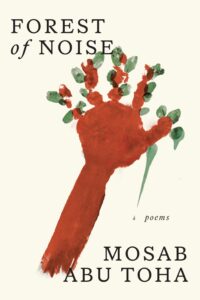
“What can a poet do when ‘what we have’ dwindles to language itself? In the early days of the Israeli offensive, Abu Toha became the diarist of a collective nightmare, typing pieces into his phone for the New Yorker. His house, like virtually every house, was destroyed; his family, like almost every family, was displaced and displaced. While trying to cross into Egypt with his wife and children, he was kidnapped by the IDF, taken to a detention center in the desert, beaten for three days. He was released only after an international campaign. ‘I think about the hundreds or thousands of Palestinians, many of them likely more talented than me, who were taken from the checkpoint,’ he later wrote. ‘Their friends could not help them.’
The poems Abu Toha fashioned from his ordeal were written in relative safety, in another kind of agony; he is now based in the US, obliged to witness from afar his people ‘skidding off the map’ while living in the country that is funding it. Images of doubling—the world and the screen, a watch that tells two kinds of time—evince a consciousness split between here and there. Split, too, between the pull of a playful, even whimsical sensibility and the brute facts demanding to be recorded.
…
“It is a measure of the past year’s enormity—the sense, week to week, that a new threshold of catastrophe has been exceeded—that even recent poems feel like relics of a more innocent time. ‘In Gaza, you leave via either Erez or Rafah, / a hard escape to make . . .’ Now there is no leaving at all. ‘I’ve personally lost three friends to war . . .’ writes Abu Toha, taking up Elizabeth Bishop’s instruction to practice the art of losing. A vertiginous line to read, knowing that hundreds of his friends, relatives, and students have now been killed.
…
“There is a harder edge in the new volume; responses to the poets who shaped him feel like rebukes to apathy or willful innocence. ‘I saw the best brains of my generation / protruding from their slashed heads’ he writes in ‘After Allen Ginsberg,’ those defiant italics writing both into and against his chosen tradition. I finished writing this piece on the Day of the Dead, in another library named after Said—a reading room at Columbia University that houses the late scholar’s own books. Outside, students were holding a vigil for those killed in Gaza, projecting the numberless names on a screen, reduced, in Etel Adnan’s phrase, to ‘contemplatives of an ongoing apocalypse.’”
–Yasmine Seale on Mosab Abu Toha’s Forest of Noise (4Columns)
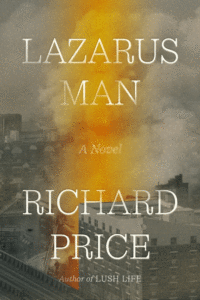
“In Lazarus Man—the first novel published under his own name since Lush Life—Price isn’t interested in felonies or blame. Half a century after launching an astonishing career that includes some of the best crime writing for books and screens, Price has let the mercy in his stories rise to the surface. On the margins, bullets still fly and drugs still flow, but the deadly alleys of Clockers and The Wire give way here to a community just trying to account for its dead and find a way forward. Even the thread of mystery strung through this plot eventually curls up like a dog beside the hearth. For a nation riven and terrified, Lazarus Man is the strangest of urban thrillers: a thoughtful, even peaceful story about stumbling into new life.
…
“Price never lets his lens rest for long on this endearing woman. Presented in two long sections with a preface and an afterword, the novel remains in relentless motion. Rather than chapters, we find short moments—sometimes a few pages; sometimes just a few sentences—quick-cutting from Mary to three other main characters who periodically pass one another like buses on different lines. As engineered by Price, this rotating structure feels entirely natural on the page even as it mimics the multiple storylines of ensemble TV shows and movies.
…
“As always, Price is rooting around in our national cellar. The gospel of optimistic self-invention is essentially America’s founding creed. As Ben Franklin advised: Act virtuous, and virtue will eventually follow. And so Anthony acts, and the muted grace accorded to him is the same promise of resurrection we all crave, whether we deserve it or not.”
–Ron Charles on Richard Price’s Lazarus Man (The Washington Post)
“The writers Joan Didion and Eve Babitz were both ambitious California natives, moved in similar circles in Hollywood in the 1960s and ’70s and died within days of each other, in December 2021. In Didion & Babitz, the journalist Lili Anolik casts them as opposite sides of the same coin: ‘two halves of American womanhood, representing forces that are, on the surface, in conflict yet secretly aligned—the superego and the id, Thanatos and Eros, yang and yin.’ For all they had in common, the book never quite paints them as the ‘secret twins’ and ‘soul mates’ the author would like us to think they are.
In one of many direct asides to the reader, Anolik states her attempt to ‘see’ both women ‘plainly’; but if Anolik knows Babitz thoroughly, and personally—from researching her 2019 book Hollywood’s Eve—Didion remains a slippery figure. In fact, the author dubiously claims that the only way to see Didion is through the ‘glass’ of Babitz.
…
“Throughout the book Anolik’s tone is self-conscious and conspiratorial, which at first feels like gossipy fun, as if she’s writing beyond the male gaze, the book both taking itself very seriously and not seriously at all. But the podcast-speak (Anolik has hosted one on Traci Lords and another on the Bennington College class of 1986) loses its charm quickly, as the intrusions start to feel cloying…
Anolik doesn’t need such stylistic indulgences to bring the reader in; she is a thorough reporter with an ear for humorous detail (apparently Didion’s husband, John Dunne, called Babitz ‘the dowager groupie’). She manages to bring her midcentury Los Angeles setting to life in a way that feels fresh, despite the era’s well-worn history.
…
“Didion feels like a supporting character in the book and their rivalry feels entirely one-sided. You end up wondering if Didion thought about Babitz much at all.”
–Marisa Meltzer on Lili Anolik’s Didion & Babitz (The New York Times Book Review)
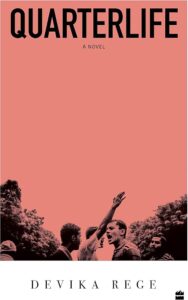
“Most contemporary novels are too narrow to allow for the truly dialogical: autofiction is a bedroom rather than an arena. Ours is an age of crazily competitive languages, yet, paradoxically, this renders us politically squeamish. For who enjoys being yelled at? Even novelists whose lenses are turned outward seem to lose their nerve when it comes to the risky art of extending the principle of charity, of endowing one’s political opponents with presumptive reason and comprehended motive. Not so the Indian writer Devika Rege, whose first novel, Quarterlife, is a fearless achievement in multifarious listening.
…
“Rege belittles none of these voices as she sets them at play and, finally, at war. She writes only from within her characters’ heads, in a close-third-person present tense that seems to confine the novelist to the job of hospitable stenographer. Short sections, each headed with a character’s name, proceed in nervous rotation. The effect is of an urgent, vital orchestration.
…
“Quarterlife—the title has to do with the relative youth of its principals—is a rich, allusive, sometimes demanding novel. In a big, ideologically equilibrious composition of this sort, the variety of different viewpoints could resemble the wrong kind of orchestration: a TV show’s market-tested kind, where diversity is just the formal or political requirement for efficient entertainment. An abstract description of the book’s major and minor characters might sound rigged in this way…But what the writer then does with this assemblage is everything, and Rege’s seriousness of purpose runs like an electrical wire through the book. Diversity is here the means of inquiry, inextricable from the questions the novel asks of diversity. What might it mean, in a very large, very diverse, religiously excitable country, to dissolve oneself into ‘something complete and great’? Can it be done without violence or discrimination? And what might ‘authenticity’ mean in a culture as variegated as modern India’s? Or in a globalized India, where, as one character puts it while appraising a Sofitel menu that boasts ten different cuisines, “these days everything has everything in it.”
–James Wood on Devika Rege’s Quarterlife (The New Yorker)
“In Us Fools, Nora Lange’s tender, exquisitely funny and supremely strange debut novel about these sisters, nothing much happens. Also, everything happens.
…
“In almost every exhilarating sentence, Lange tries to plug the vast, diseased expanse of our country’s history into this particular set of characters it has doomed: ‘The term “nuclear family” had been installed in America like the questionable electric wiring in our house, which would fail.’
This short-circuiting substitute for plot might confound some readers conditioned to seek cause and effect. These same readers, if gathered in a creative writing workshop, might question the authenticity of a 9-year-old declaring, ‘We are surrounded by America with its orgies of barbarism,’ or, ‘For identity to be realized … one must come to the place where identity dissolves.’ I admit, sometimes, I’m one of these readers.
But progress and authenticity are among the myths Us Fools entices us to question. The Fareown sisters have made a preoccupation of defying others’ expectations of them, including their own. They’ve been underestimated and derided as much as they’ve been idealized and flattened by the urban undergrads and Hollywood actresses who insist that ‘Midwesterners have souls. They are the soul of America.’ Bernadette has developed a deadpan shrug to this lifetime of dismissal from the coastal gentry: ‘Unusual temperatures were expected to reach “as far away as Illinois.” That far.’
This may be a story about the most painful and absurd moments of the 1980s, ’90s and aughts in our country, and it may occasionally read more like a microfiche series of Time magazine covers than history experienced. But it’s also a novel that is uniquely and urgently about and for today, mapping the uncrossable distance between the coasts and the heartland, between the America we’ve been and the America we want to be.
…
“Being with this book requires the same quiet stamina, and its reward is to witness a rapturous and rare kind of truth. Once I surrendered to it, this savage American novel consumed me, as much as I consumed it.”
–Eleanor Henderson on Nora Lange’s Us Fools (The New York Times Book Review)
Book Marks
Visit Book Marks, Lit Hub's home for book reviews, at https://bookmarks.reviews/ or on social media at @bookmarksreads.










